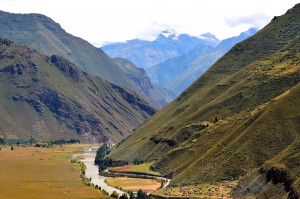 The concept of ecological economics is gaining popularity around the world very rapidly. Economics and Ecology are no longer two different subjects. It has been established beyond doubt by environmentalists and economists around the world that there is no alternative to sustainability to overcome the economic and ecological problems, and it is not only limited to the United States but also problems that are faced by countries around the world today.
The concept of ecological economics is gaining popularity around the world very rapidly. Economics and Ecology are no longer two different subjects. It has been established beyond doubt by environmentalists and economists around the world that there is no alternative to sustainability to overcome the economic and ecological problems, and it is not only limited to the United States but also problems that are faced by countries around the world today.
GDP Vs. GPI – Are we making genuine progress?
Judging from GDP (Gross Domestic Product) around the world, our production of goods and services has more than tripled since 1950. This means we are officially producing three times more finished products and services around the world today than what we did in 1950. We can genuinely see the reflection of these numbers in our daily lives. Think about how many families had TVs, phones or automobiles in the 1950s and how many they have now. You’d have to spend $300, to buy a TV set that would not even show color. With the same equivalent amount of money, which comes to about $2,754.80, you could buy top of the line HD TV today. Less than 3% of the households owned 3 cars or more back then, although many regarded the 1950s and 1960s as the golden era in History of the United States, right after World War ll. Back in the 1950s, USA had emerged as one of the wealthiest and strongest nations in the world, with abundant resources, work forces, jobs, and so on. USA was truly a “land of opportunity and dreams.”
With technological advancements, things like food and electronics are getting cheaper and cheaper with every passing year. The breakfast that you had this morning is almost as good as what queen of England had in the 50s, and the processor that you have in your mobile phone today is far more powerful than the NASA computers in the 60s that cost less than a fraction of a percent of what NASA had spent to build their first computers.
Despite our technological advancements and progresses and increase in our global GDP, our GPI or Genuine Progress Indicator shows that our progress has in fact declined since 1978. This is an estimate of global progress on average, and some countries of the world have made more progress than other. Moreover, GDP wasn’t designed to measure the overall progress of the globe. It is also has many limitations in several ways. GDP cannot measure social values, caring for each other, raising children, voluntary work and so on which are very important for social and economic growth. GPI fine-tunes GDP by adjusting distribution of income, adding the value of volunteer and household work, and subtracting social and environmental costs.
Sustainability and Economy
When we calculate GPI, the environmental costs are deducted from it, so as our environmental footprint increases, our GPI decreases. In the 1978, our per capita GPI was at its peak. Coincidentally, the global ecological footprints also exceeded the global bio-capacity. Could this mean that there could be a correlation between GPI and global carbon footprints? Our environmental costs have been increasing since 1978 and so our overall costs are exceeding the benefits. As our carbon footprints increase, we deplete our capital assets of nature, rather than benefiting from it. So even though we are making economic progress, we are not making genuine economic progress until it becomes a sustainable progress.
the environmental costs are deducted from it, so as our environmental footprint increases, our GPI decreases. In the 1978, our per capita GPI was at its peak. Coincidentally, the global ecological footprints also exceeded the global bio-capacity. Could this mean that there could be a correlation between GPI and global carbon footprints? Our environmental costs have been increasing since 1978 and so our overall costs are exceeding the benefits. As our carbon footprints increase, we deplete our capital assets of nature, rather than benefiting from it. So even though we are making economic progress, we are not making genuine economic progress until it becomes a sustainable progress.




